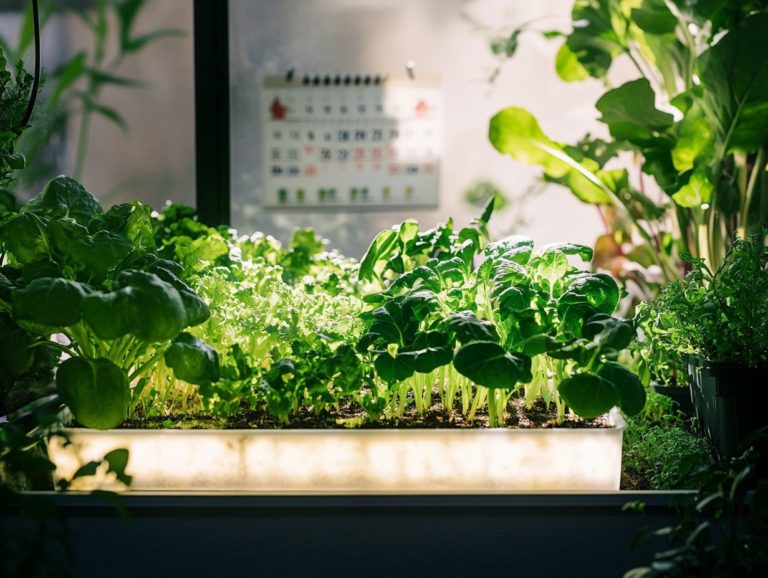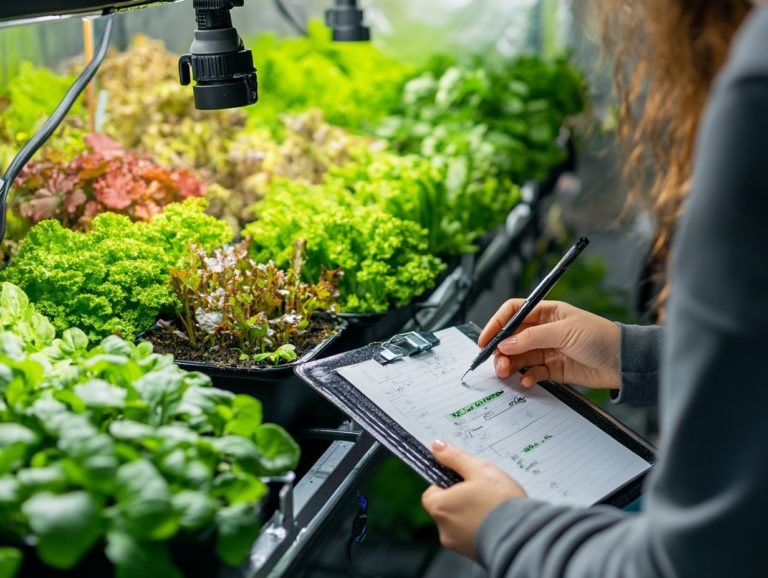What Research is Being Done on Hydroponics?
Hydroponics changes how we think about agriculture. It allows plants to grow without soil, using innovative methods like vertical farming.
Interest in sustainable farming is rising. Researchers are exploring hydroponics, focusing on key areas like plant science and new technologies.
Hydroponics offers many benefits for agriculture and the environment. It also suggests exciting future directions for this field.
Explore the key developments shaping the future of food production.
Contents
- Key Takeaways:
- Current State of Hydroponics Research
- Advancements in Hydroponic Technology
- Benefits of Hydroponics Research
- Future Directions for Hydroponics Research
- Frequently Asked Questions
- What research is being done on hydroponics for sustainable agriculture?
- What new technologies are being studied for hydroponic farming?
- What are some current challenges being addressed in hydroponic research?
- How is hydroponic research contributing to food security?
- What research is being done on the nutritional quality of hydroponically grown crops, including studies on Arabidopsis thaliana?
- What are the potential future developments in hydroponic research?
Key Takeaways:
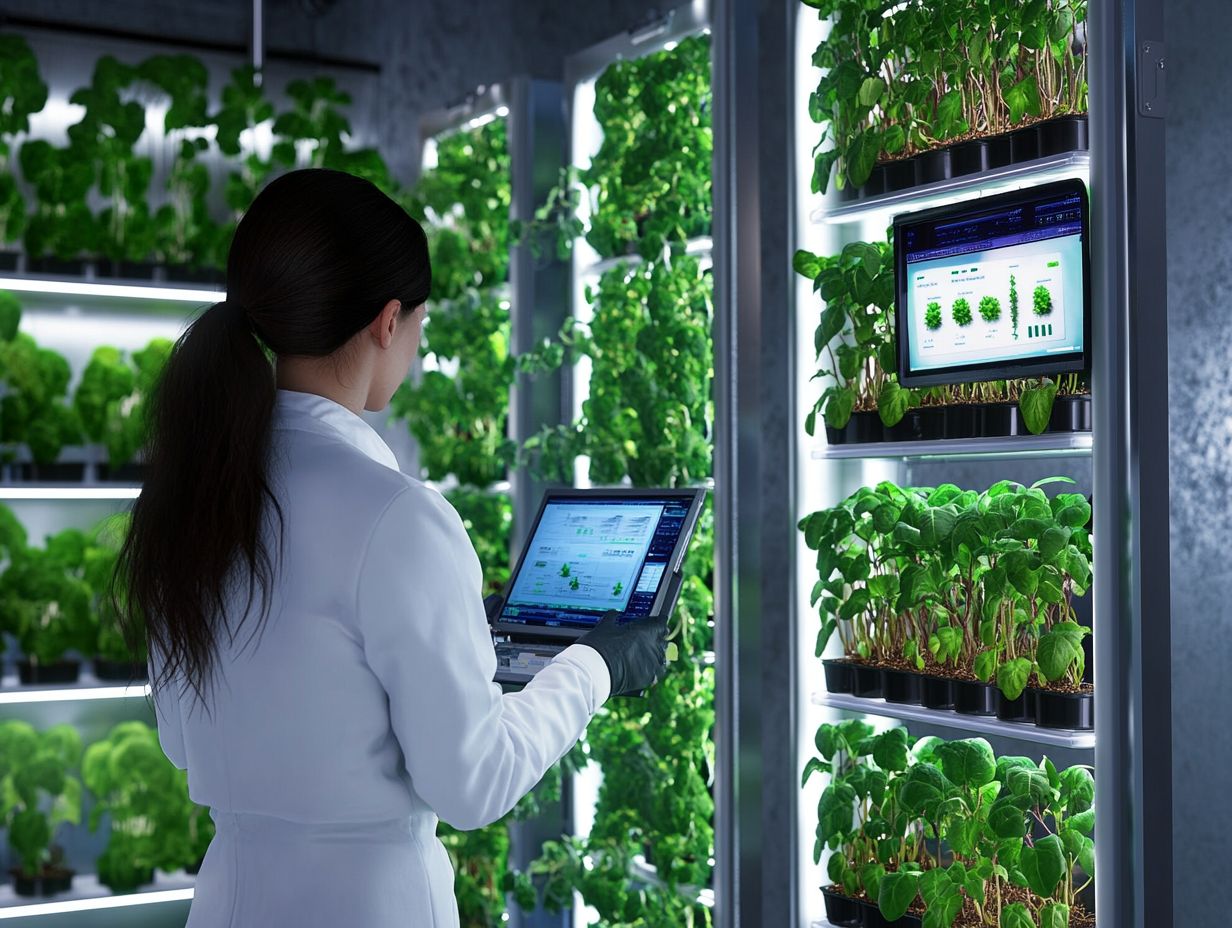
- Hydroponics research focuses on innovative tools to grow plants efficiently without soil.
- Advancements in hydroponics could reshape our food production methods.
- Future research aims to maximize yields while protecting the environment.
What is Hydroponics and Why is it Studied?
Hydroponics represents a groundbreaking method of cultivating plants without soil, employing a nutrient solution a mix of water and minerals that plants need to grow delivered directly to the roots.
This innovative approach has garnered considerable attention in recent years for its remarkable potential to enhance plant growth and boost crop yields in controlled environments.
Research conducted by NASA, particularly through initiatives within the Space Technology Mission Directorate and Life Sciences Division, has underscored hydroponics’ feasibility for food production in space. This positions it as a pivotal strategy for future agricultural practices aimed at meeting the escalating food demand on Earth, as highlighted by the United Nations.
The origins of hydroponics trace back to ancient civilizations, yet it has evolved into a sophisticated science enriched by modern innovations. Unlike traditional farming, which depends on arable land and unpredictable weather patterns, hydroponic systems can thrive in urban landscapes or arid regions, substantially diminishing the reliance on natural resources.
The benefits are incredible! Let s dive in: faster growth rates, a reduced necessity for pesticides, and significant water conservation, a critical consideration in light of global water scarcity challenges.
As urban populations continue to surge and climate change poses threats to conventional agriculture, hydroponics emerges as a sustainable solution for producing fresh food in even the harshest environments. This safeguards food security for the future, especially in the context of urban agriculture.
Current State of Hydroponics Research
The current landscape of hydroponics research is evolving at an impressive pace. It emphasizes the enhancement of nutrient solution efficiency and looks into innovative applications within urban agriculture and the Controlled Environment Agriculture (CEA) sector, with notable contributions from entities like Plenty Unlimited and CSS Farms.
Researchers are actively exploring how these soil-free systems can dramatically boost crop yields while playing a crucial role in sustainable food production.
Major Areas of Study
Major areas of study in hydroponics revolve around plant nutrition, nutrient solutions, environmental control, and the physiological responses of plants. These fields aim to optimize growth conditions and enhance the efficiency of nutrient uptake in soil-free systems, essential for the success of vertical farming initiatives.
Your understanding of plant nutrition is crucial, as ongoing research explores the ideal balance of macronutrients (nutrients required in large amounts) and micronutrients (nutrients needed in smaller quantities) needed for various crops. For example, studies reveal that adjusting nitrogen levels can significantly influence yields in leafy greens.
Nutrient solutions tailored to individual plants can also boost metabolic efficiency.
Environmental control is equally critical. Precise management of temperature, humidity, and light can lead to optimal photosynthesis and growth rates. Recent findings indicate that integrating smart technology, like sensors and automated systems, can enhance monitoring and adjustment of these key parameters.
A thorough comprehension of plant physiology is fundamental for refining hydroponic practices. This knowledge ultimately paves the way for sustainable agriculture solutions that could revolutionize the industry.
Advancements in Hydroponic Technology
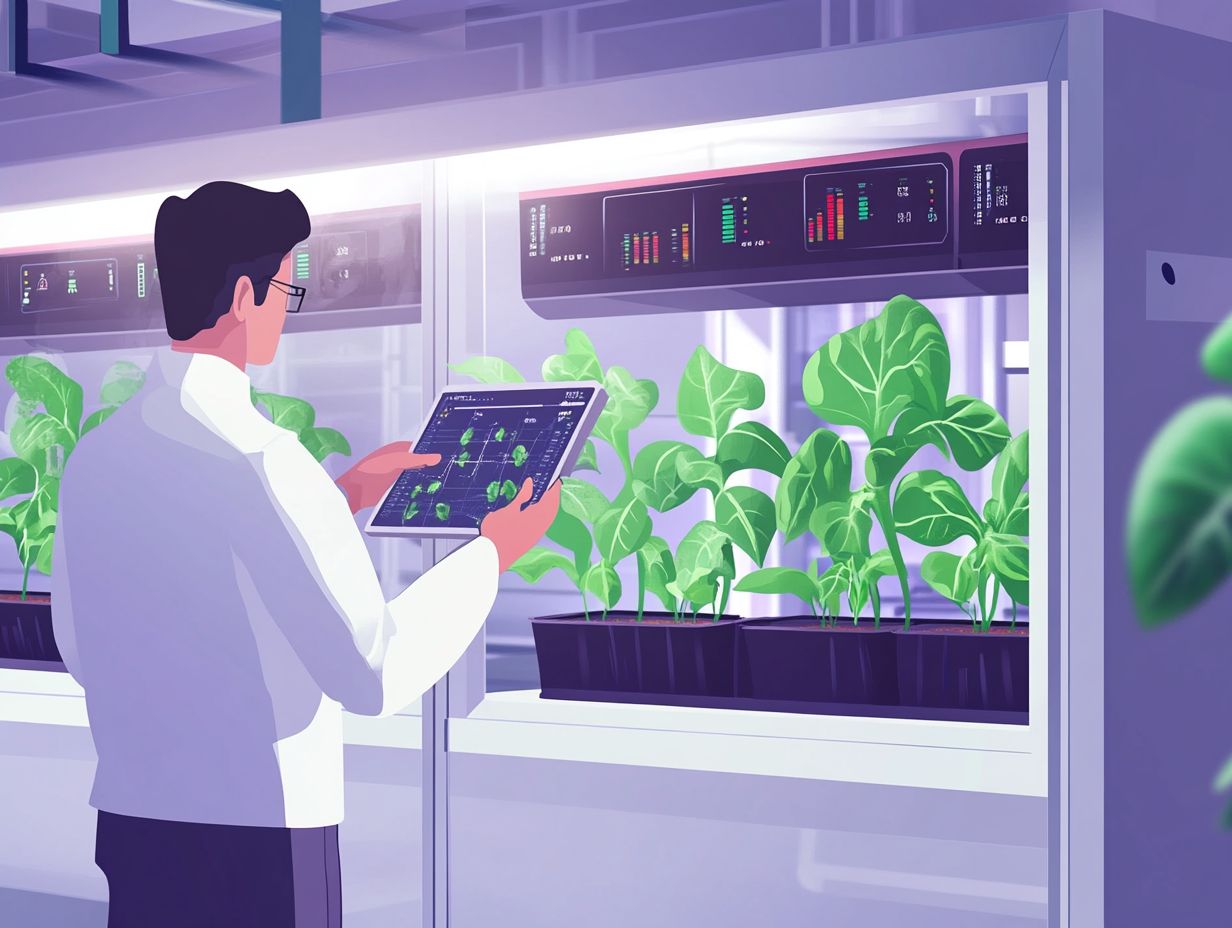
Advancements in hydroponic technology are transforming your approach to agriculture, especially within vertical farming systems. These exciting innovations leverage cutting-edge techniques and artificial lighting to maximize plant growth.
These innovations are inspired by space technology, with the goal of establishing more sustainable food production methods that can effectively meet the increasing global food demand.
Innovative Techniques and Tools
Innovative techniques and tools in hydroponics are crafted to elevate efficiency and sustainability. This is especially true regarding nutrient solutions and water usage in food production systems. By fine-tuning these aspects, hydroponics can dramatically lessen the environmental footprint of agriculture.
The incorporation of automated nutrient delivery systems empowers you to manage nutrient levels with precision, ensuring that your plants receive exactly what they require without excess runoff that can strain local ecosystems.
Implementing advanced water recycling methods conserves this vital resource and reduces waste. This creates a closed-loop system that benefits both your crops and the environment, particularly in urban agriculture settings.
With advanced monitoring systems equipped with sensors, you can track plant health and nutrient uptake in real-time. This allows you to make informed adjustments that maximize yields while minimizing inputs.
Collectively, these innovations mark a significant shift toward more sustainable agricultural practices, paving the way for a greener future.
Benefits of Hydroponics Research
Hydroponics research offers much more than just better plant growth; it represents substantial advancements in agriculture and sustainability. These advancements are crucial for addressing challenges highlighted by the United Nations.
By enabling higher crop yields and more efficient food production methods, these benefits are essential for tackling the challenges posed by increasing global food demand and environmental constraints.
Act now to embrace these changes and explore how hydroponics can transform your approach to sustainable farming today!
Impact on Agriculture and Sustainability
The impact of hydroponics on agriculture and sustainability is nothing short of transformative. This method promotes controlled growing environments that significantly reduce your carbon footprint while effectively tackling food demand through innovative agriculture techniques.
By maximizing resource utilization and minimizing waste, hydroponics presents a sustainable solution to the pressing challenges of modern agriculture.
This innovative approach gives you the power to cultivate crops in urban settings where arable land might be a scarce commodity. It simultaneously sparks renewed interest in local food production.
As hydroponics gains momentum, it challenges traditional farming methods and encourages a shift toward precision agriculture (using technology to make farming more accurate and efficient), harnessing technology for data-driven decision-making.
While there s a transition ahead, it s packed with thrilling opportunities! The initial startup costs and the technical know-how required can seem intimidating for conventional farmers. Yet these challenges are surmountable with support from educational institutions like Purdue University. This transition also opens the door to significant opportunities for education and collaboration, paving the way for a new generation of sustainable practices that could redefine food systems on a global scale.
Future Directions for Hydroponics Research
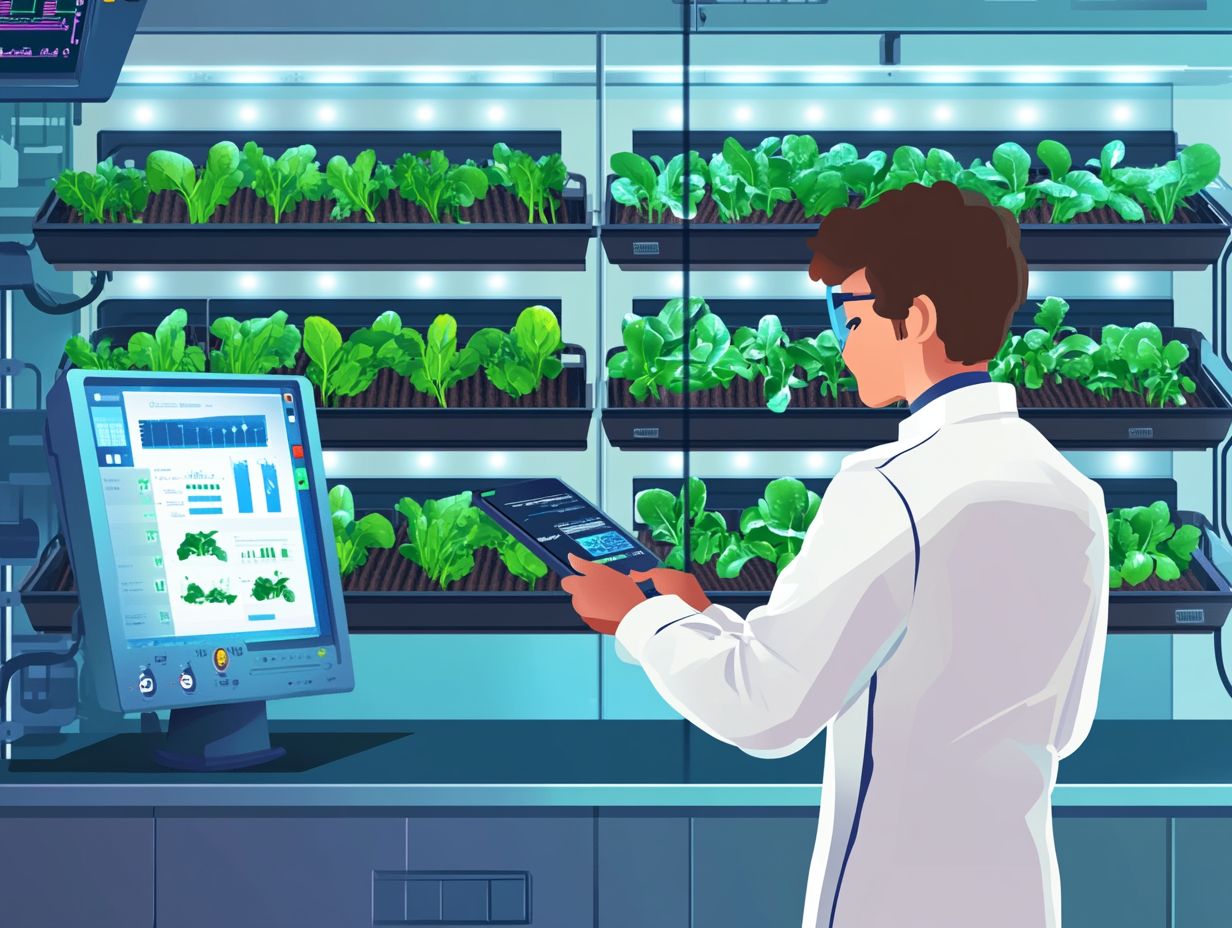
Exciting new paths in hydroponics research await! Numerous potential areas for growth and improvement are ready to explore. There will be a focus on enhancing the efficiency of nutrient solutions (the mixture of water and nutrients plants need), integrating cutting-edge technologies, and deepening the understanding of plant biology.
These pursuits are not merely academic; they aim to tackle global food challenges and elevate agricultural sustainability, ultimately contributing to a more resilient future for food production.
Potential Areas for Growth and Improvement
Potential areas for growth and improvement in hydroponics lie in refining technologies, enhancing sustainability measures, and expanding your research into innovative growing techniques. Collaborations with experts like Ray Wheeler and Henry Sztul will be essential for you to achieve these advancements.
One promising direction involves integrating renewable energy sources, such as solar and wind, to power your hydroponic systems and significantly reduce their carbon footprint. Improving nutrient delivery systems through precise monitoring and automated adjustments ensures your plants receive optimal levels. This ultimately boosts growth rates and crop quality, which is vital in the competitive Controlled Environment Agriculture (CEA) industry.
Enhancing research on plant disease resistance, a focus of NASA research, can lead to more resilient crops. This minimizes your reliance on chemical treatments while also considering organic nutrients. These collective improvements not only elevate the efficacy of hydroponic systems, such as those developed by Plenty Unlimited and CSS Farms, but also align them with modern sustainability goals, as highlighted by the United Nations. For insights on how these advancements shape the industry, explore future trends in hydroponics, paving the way for a more secure food future.
Frequently Asked Questions
What research is being done on hydroponics for sustainable agriculture?
There is ongoing research on using hydroponic systems for sustainable agriculture. This includes exploring the use of alternative nutrient solutions, optimizing lighting and temperature conditions, and developing efficient irrigation methods.
What new technologies are being studied for hydroponic farming?
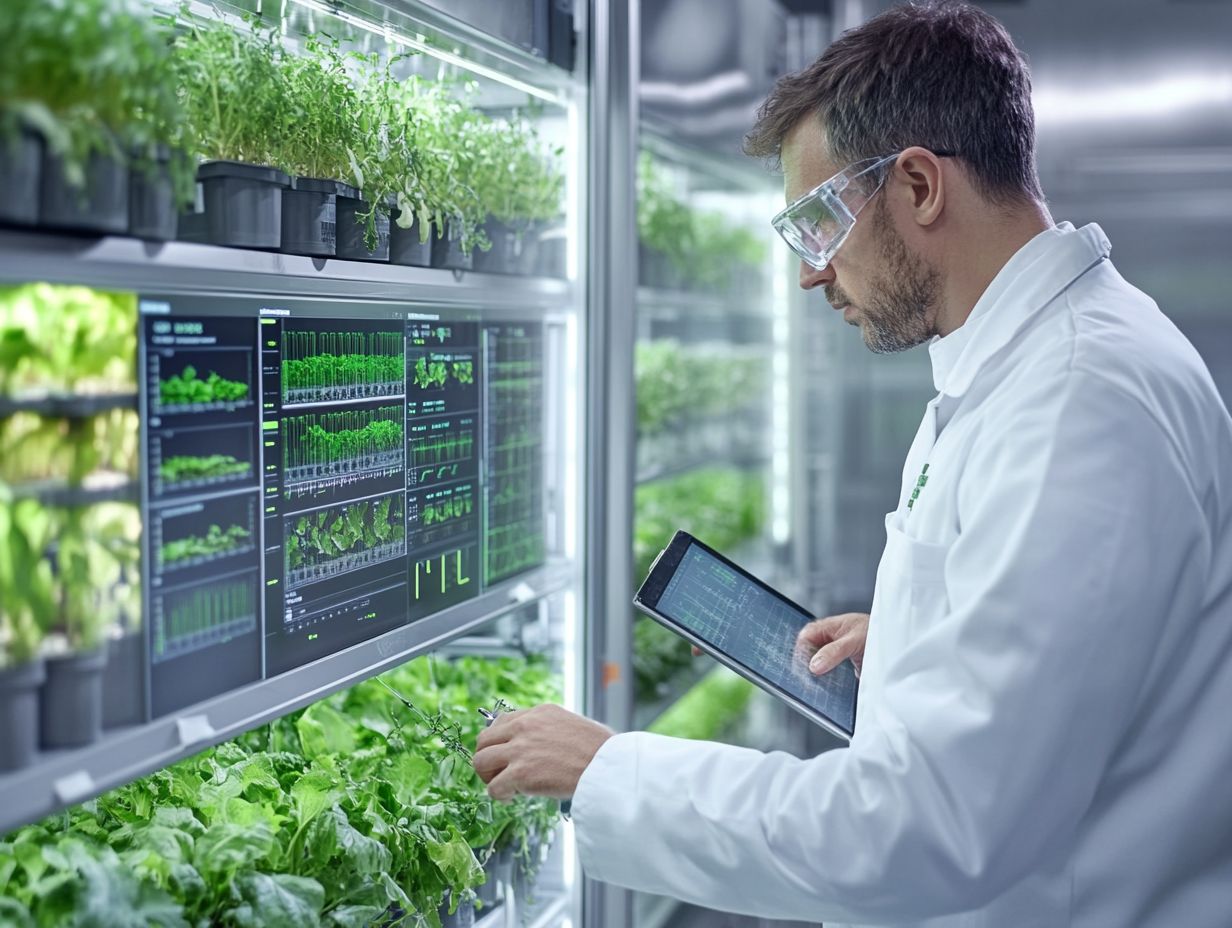
Researchers are investigating the use of advanced technologies such as vertical farming, automated control systems, and the innovative techniques utilized by Ray Wheeler from NASA. They are also exploring artificial intelligence in hydroponic farming to increase productivity and reduce costs.
What are some current challenges being addressed in hydroponic research?
Current research tackles key challenges in hydroponics. This includes reducing the environmental impact and finding sustainable nutrient sources.
How is hydroponic research contributing to food security?
Hydroponic research boosts food security. It allows crops to be grown in urban areas while using less water and land.
What research is being done on the nutritional quality of hydroponically grown crops, including studies on Arabidopsis thaliana?
Scientists are examining the nutritional quality of hydroponically grown crops. They compare these to traditionally grown crops to see if there’s a difference.
What are the potential future developments in hydroponic research?
Exciting future developments in hydroponic research could change how we grow food! This includes using nanotechnology for nutrient delivery and creating new crop varieties suited for hydroponics.

